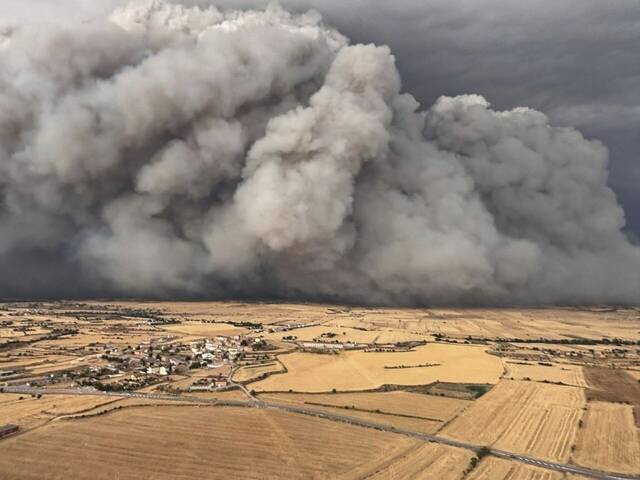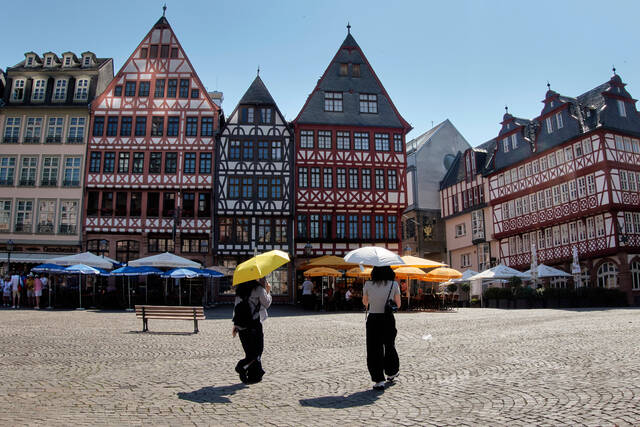BARCELONA, Spain — A European heat wave helped fuel a virulent wildfire in Spain that killed two farmers before hundreds of firefighters brought it under control thanks to a timely rainstorm, authorities said Wednesday.
The blaze that broke out late on Tuesday in the rural province of Lleida created an enormous thick plume of ash and smoke that reached 45,000 feet of altitude, making it the largest registered by firefighters in Catalonia, a northeastern region of Spain.
Firefighters said that the fire spread at 17 mph at one point, making it one of the fastest fires registered in Europe, they said.
Catalan regional president Salvador Illa announced the deaths, which occurred late Tuesday, in a social media post around midnight. Firefighters said that the two victims were found near the small village of Coscó in the county of La Segarra near a vehicle. Regional official Nuria Parlón said that the two victims were a farmer and one of his workers. She said that it appears that they were caught by the flames as they were trying to flee the farm.
Two firefighters also needed to be treated a local hospital for injuries.
Rain played a helping hand
A total of 16,000 acres, mostly of fields growing grains and cereals, was burned before firefighters got some help from a rainstorm and established a perimeter. Authorities issued warnings to residents via messages to smartphones and ordered 14,000 people to stay indoors, firefighters said. That order was lifted late Tuesday as more than 500 firefighters participated in the deployment.
Firefighters said that the rainstorms “quickly changed the situation and helped speed up getting the fire stabilized.”
The fire destroyed mostly farmland, but it also incinerated at least three old farmhouses and some other farm buildings before it was declared under control early Wednesday.
“Wildfires today are not like they were before,” Illa, the regional president, said. “These are extremely dangerous. From the very first moment, it was considered to be beyond the capacity of extinction. I mean that not even with two or three times the number of firefighters, they have told me, it would have been possible to put out.”
The heat wave in parts of Europe has set record high temperatures for June in Spain and Portugal.
More hot weather is expected on Wednesday with temperatures in the Lleida region forecast to reach a high of 102 degrees.
“It will be a difficult day due to the high temperatures and until we get past the hottest part of the afternoon we will have to be on our guard,” Illa said.
Spain bakes
Spain has been sweltering under its first heat wave of the year since the weekend. Its weather service said that the national average for June of 74 degrees was a new record. It was the first time that June was hotter than the average temperatures for both July and August.
Except for Spain’s northern Atlantic coast, the country remained under alert for high temperatures and for wildfire risk on Wednesday.
In Spain’s southern city of Malaga, the international Red Cross set up a “climate refuge” that is air-conditioned down to the low of about 70 degrees to help residents “cope with the heat in comfort and with company, avoiding the isolation and loneliness” that extreme heat can impose as people stay indoors.
The Spanish Red Cross was also providing an “assisted bathing service” to help people with reduced mobility to cool down in waters at the beach.
The European Center for Medium-Range Weather Forecasts said that it was closely monitoring the abnormally hot temperatures for the continent. Weather experts link the heat wave to climate change.
More than two-thirds of the severest heat waves in Europe registered since 1950 have occurred since 2000, the World Meteorological Organization says.
France’s national weather agency kept four departments under red alert on Wednesday after temperatures exceeded 104 degrees in many towns. The summit of Paris’ iconic Eiffel Tower remained closed until Thursday for “everyone’s comfort and safety.”
Air conditioning strains Italian power
Heat alerts were issued for 17 Italian cities Wednesday. The corresponding surge in air conditioning was straining the electric grid and causing periodic blackouts. On Tuesday, parts of Florence’s historic center — which is packed with hotels, restaurants and shops — had a blackout following a surge in electricity use, energy company Enel said.
Italy’s labor ministry, meanwhile, summoned union representatives to a meeting Wednesday to finalize a protocol on protecting farm, construction and other workers who labor outdoors from heat exposure.
This came after a construction worker died in Bologna this week.
Switzerland protects river
In Switzerland, one of the two reactors at the Beznau nuclear power plant was shut down as part of efforts to prevent excessive warming of the Aare River, so as not to further burden wildlife and the overall ecosystem in already hot weather, operator Axpo said.

